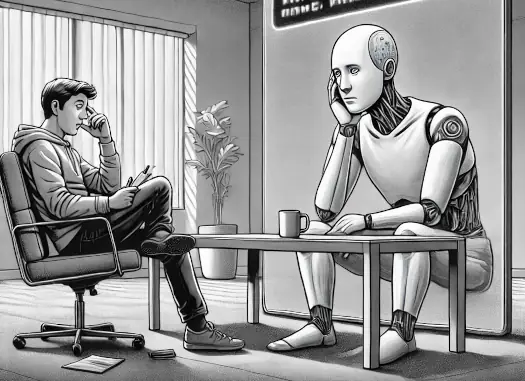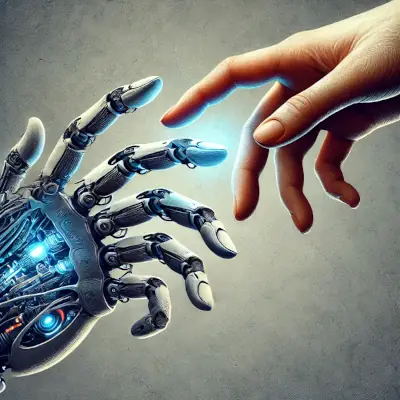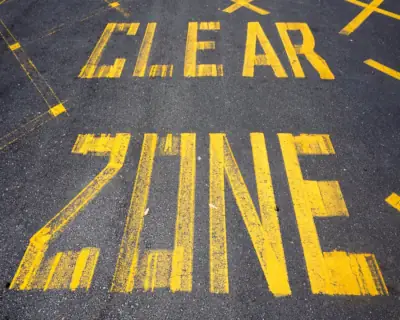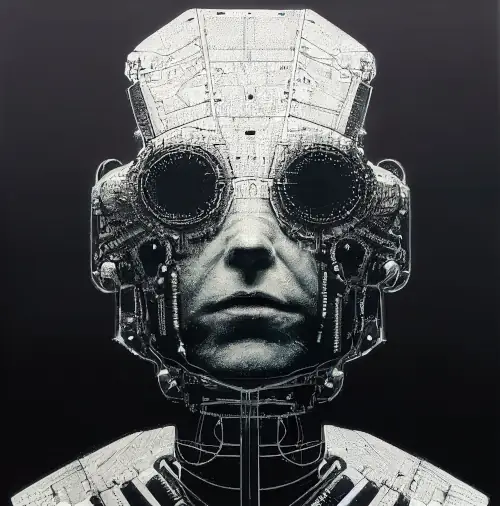Being Coached by an AI
. . . Seriously ?!
We’re seeing more and more articles praising the coaching capabilities of AI: promises of quick advice, precise analyses, and pseudo-compassion. But entrusting your doubts, ambitions, or struggles to a machine? Seriously?
Real coaching is having a human in front of you, someone who notices your silences, feels your hesitations, and helps you move forward to places you never thought possible. It’s not about ready-made solutions or cookie-cutter answers. It’s about a real connection, asking the right questions, and offering support that truly resonates with who you are and what you need.
So, being coached by an Artificial Intelligence? Honestly?
Also Worth Reading :
Empathy: what AI will never feel
Would you really trust an AI to discuss your doubts, ambitions, or struggles? A machine that analyses your responses in a completely cold, detached way, based solely on syntactical rules? Today’s AIs—“LLMs” or Large Language Models—are nothing more than that.
Real coaching is nothing like that. It’s about connection. A human coach notices your silences, senses your hesitations, and adjusts their approach to meet you where you are. They reflect your emotions, your strengths, and sometimes even your contradictions in a way that resonates and inspires you to move forward. This kind of empathy—listening with both heart and mind—is what makes the experience truly unique. It’s not about generic advice; it’s about feedback that hits home.
Above all, a human coach is present. Not virtual, not artificial—someone real, who creates a space where you feel understood and supported. Coaching, at its core, is like a dance. Coach and client move together, in rhythm and synchrony, forming a genuine, meaningful connection.
And this is exactly what an AI will never have: heart, empathy, and the ability to truly understand what you’re feeling.
Non-Verbal: reading between the lines
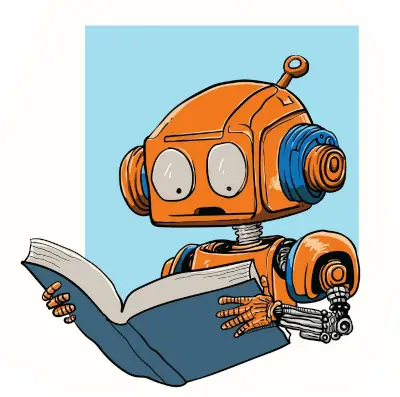
Coaching isn’t just about what you say—it’s also about everything you don’t say. Silences, gestures, looks… all those subtle signals that speak volumes without words.
AI? No matter how advanced, it’s blind to these subtleties. It doesn’t notice the tension in your voice, the discomfort in your posture, or the fragility in your tone. It only responds to the words you say out loud.
A human coach, on the other hand, notices every detail. They read between the lines, sense what’s left unsaid, and adapt their approach based on what they feel. Because often, what makes the difference isn’t the words—it’s the deeply human act of listening beyond them.
Coaching isn’t just about what you say—it’s also about everything you don’t say. Silences, gestures, looks… all those subtle signals that speak volumes without words.
AI? No matter how advanced, it’s blind to these subtleties. It doesn’t notice the tension in your voice, the discomfort in your posture, or the fragility in your tone. It only responds to the words you say out loud.
A human coach, on the other hand, notices every detail. They read between the lines, sense what’s left unsaid, and adapt their approach based on what they feel. Because often, what makes the difference isn’t the words—it’s the deeply human act of listening beyond them.

Comfort Zone: where coaching really begins
Coaching always starts with establishing a shared comfort zone. Not the kind where you stay cosy and avoid challenges, but the kind where both coach and client feel aligned and secure. This creates a space where anything can be addressed, safely.
And if that’s not possible, it’s better to consider another option. That’s why, once, when faced with a prospective client I didn’t feel aligned with, I made the important decision to recommend another coach. Because effective coaching relies on an authentic relationship. If either party isn’t fully comfortable, it’s better to step back.
Playing with the boundary between comfort and growth is the art of coaching. And that’s what makes human guidance irreplaceable. AI can’t feel, can’t adapt, and can’t go where you’ve never been… just as it can’t either, by definition.
Navigating Paradoxes: Reconciling the Unreconcilable
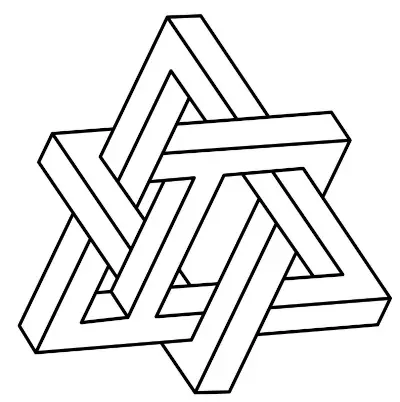
In coaching, paradoxes are part of the process. Wanting to be an inspiring leader while fearing a loss of control. Striving for work-life balance while feeling guilty about giving too much—or too little—to one or the other. Wanting more responsibility while doubting your ability to handle it. These contradictions aren’t dead ends—they’re often opportunities to grow, provided you know how to explore them.
Where AI might try to “resolve” these paradoxes by making you choose an option—“Be more direct” or “Be more attentive”—a human coach creates space for these opposites to coexist. For example, being firm AND kind. Coaching isn’t about eliminating contradictions; it’s about understanding and integrating them.
Navigating paradoxes means learning to embrace them, turning them into strengths rather than obstacles. That’s the art of human coaching.
In coaching, paradoxes are part of the process. Wanting to be an inspiring leader while fearing a loss of control. Striving for work-life balance while feeling guilty about giving too much—or too little—to one or the other. Wanting more responsibility while doubting your ability to handle it. These contradictions aren’t dead ends—they’re often opportunities to grow, provided you know how to explore them.
Where AI might try to “resolve” these paradoxes by making you choose an option—“Be more direct” or “Be more attentive”—a human coach creates space for these opposites to coexist. For example, being firm AND kind. Coaching isn’t about eliminating contradictions; it’s about understanding and integrating them.

The role of the coach is not to eliminate contradictions but to help understand and integrate them. The coach supports you in understanding these tensions, exploring your fears, and seeing how they can be transformed.
Reconciling paradoxes means learning to embrace them, turning them into strengths rather than obstacles. That’s the art of human coaching.
One Step Ahead: Where AI Can’t Take You
A great coach is a guide. They walk alongside you but are always just one step ahead. Not to impose direction, but to illuminate the path, anticipate obstacles, and open perspectives you may not have considered.
Imagine a young executive considering a promotion. On paper, it’s perfect: more responsibilities, better pay, and flexible hours. Yet, she hesitates. An AI would analyse the facts and confirm whether the promotion is a “good decision” or not. A human coach, however, would notice the hesitation and feel the doubts. “What’s really holding you back?” “What comes to mind when you think about this promotion?” “If you felt totally free, what would your first thought be?”
It’s not just a decision to make; it’s an exploration to understand what truly matters in this choice. Perhaps she aspires to a role more aligned with her values, fears sacrificing her work-life balance, or maybe she’s simply content where she is. And perhaps the issue lies elsewhere.
Being one step ahead means guiding without directing. Helping you see further, while learning to trust your own feelings, your own intuition. And it is this self-confidence, ultimately, that makes all the difference in moving forward. And that is something no algorithm can ever provide.
Coaching: above all, a human process
So, being coached by an AI… why not. But if what you’re looking for is true transformation—an experience that pushes you to grow while respecting your nuances and values—there’s no contest: only a human coach can provide that.
AI, today’s “LLMs”, based on statistical calculations, can analyse, compile data, and deliver responses extremely quickly, sometimes even feigning a hint of compassion. But ultimately, it’s a cold process, lacking any real understanding of human paradoxes or our shared complexity. A human coach listens to your silences, senses your emotions, and helps you embody change.
It’s a companion on your journey, a guide always by your side, in sync with your steps, ready to ask the right questions, on the right topics, at the right time, to help you move forward.
So next time you think about coaching, ask yourself this: do you want an algorithm that “understands” you… or someone who truly feels what you’re experiencing? The difference is there. And that’s where the true key to change lies.
PS: If your coach feels no different from an AI, here’s some advice: maybe it’s time to find another one. 😉
Life coach for leaders, managers and project leaders. Professional development. Certified International Coaching Federation coach, work-life balance coach and Mental Fitness coach, InterQualia Flow assessment. Certified coach in Switzerland, Lausanne, Yverdon, Geneva and Online. France & Canada © 2018 – 2025 – Design and production Alternatives et Transitions Coaching
Illustrations credits: personal compositions and pixabay.com

